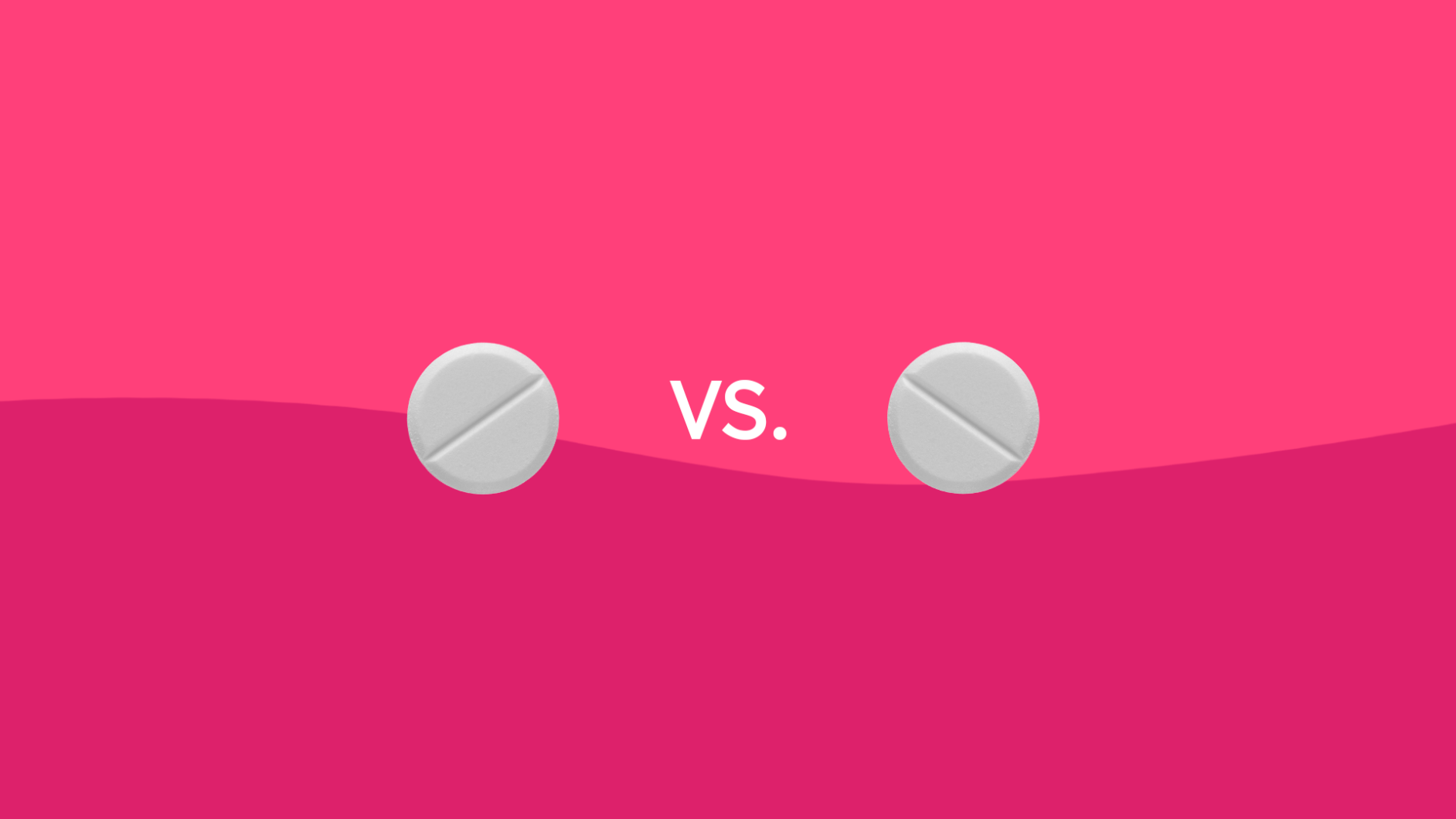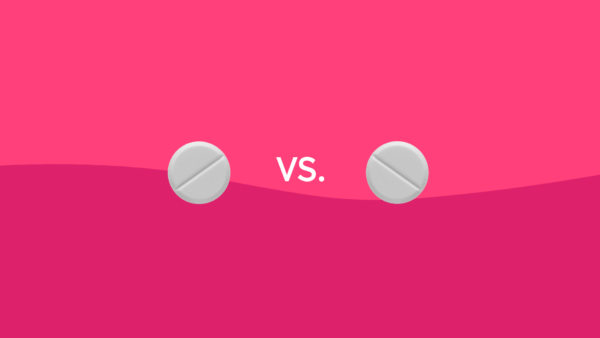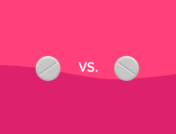Drug overview & main differences | Conditions treated | Efficacy | Insurance coverage and cost comparison | Side effects | Drug interactions | Warnings | FAQ
Ritalin (methylphenidate) and Adderall (amphetamine/dextroamphetamine) are two of the most common stimulant medications used to treat ADHD or attention deficit hyperactivity disorder. Sometimes, behavioral therapy may be enough to help treat ADHD. In many cases, however, treatment with medications like Ritalin or Adderall is needed.
Stimulant medications work by blocking the reuptake of certain neurotransmitters in the brain. In effect, these medications help increase the activity of norepinephrine and dopamine to help improve focus and alertness. Ritalin and Adderall can also help improve wakefulness in people with narcolepsy.
Although Ritalin and Adderall work in similar ways, they have differences in doses and formulations. They also have differences in how fast they work and how long their effects last.
What are the main differences between Ritalin and Adderall?
The main difference between Ritalin and Adderall is in their main ingredients. Ritalin contains methylphenidate hydrochloride and Adderall contains a combination of amphetamine and dextroamphetamine.
Ritalin is a short-acting drug that reaches peak levels in the body in a shorter amount of time compared to Adderall. Ritalin can reach peak levels within 1 hour while Adderall reaches peak levels around 3 hours after administration. In this way, Ritalin starts working faster than Adderall.
In contrast, Adderall generally stays in the body longer than Ritalin. The average half-life is 10 to 13 hours for Adderall and 3 to 4 hours for Ritalin. A long-acting form of Ritalin, called Ritalin LA, is also available and lasts around 8 hours.
| Main differences between Ritalin and Adderall | ||
|---|---|---|
| Ritalin | Adderall | |
| Drug class | CNS Stimulant | CNS Stimulant |
| Brand/generic status | Brand and generic available | Brand and generic available |
| What is the generic name | Methylphenidate | Dextroamphetamine/amphetamine salts |
| What form(s) does the drug come in? | Oral tablet and extended-release tablet | Oral tablet and Extended-release tablet |
| What is the standard dosage? | 20 to 30 mg, two or three times daily as directed by a doctor | 5 to 40 mg once in the morning and then every 4 to 6 hours as directed by a doctor |
| How long is the typical treatment? | Short-term or long-term use may be appropriate depending on your doctor’s prescription | Short-term or long-term use may be appropriate depending on your doctor’s prescription |
| Who typically uses the medication? | Adults and children 6 years of age and older | Adults and children 3 years of age and older |
Want the best price on Adderall?
Sign up for Adderall price alerts and find out when the price changes!
Conditions treated by Ritalin and Adderall
If you or your child is diagnosed with ADHD, a central nervous system stimulant like Ritalin or Adderall may be prescribed. Ritalin and Adderall are both FDA-approved to treat ADHD symptoms, such as inattention, impulsiveness and restlessness. Both medications are also FDA-approved to treat narcolepsy, a sleep disorder characterized by daytime drowsiness and an excessive need to sleep.
Off-label uses of Ritalin and Adderall include treatment for other mental health problems like depression or anxiety, especially in patients who have ADHD. These stimulants have also been studied to treat bipolar disorder. One literature review has deemed CNS stimulants a possible treatment option for bipolar disorder although their effectiveness is still being studied.
Other unapproved uses for Ritalin and Adderall include weight loss treatment and enhancement of cognitive functions, such as learning and memory. These unapproved uses may lead to drug abuse or misuse in some people. Studies have found that, in those without ADHD, these stimulants do not improve cognitive functions. Instead, they may actually lead to negative cognitive effects.
| Condition | Ritalin | Adderall |
| Attention deficit hyperactivity disorder (ADHD) | Yes | Yes |
| Narcolepsy | Yes | Yes |
| Depression | Off-label | Off-label |
| Anxiety | Off-label | Off-label |
| Bipolar disorder | Off-label | Off-label |
Is Ritalin or Adderall more effective?
Ritalin and Adderall are both effective medications to treat ADHD and narcolepsy. One option may work better depending on how your body responds to the drug. Whether you use immediate-release or extended-release formulations can also affect how well a drug works for you.
According to a meta-analysis which included 133 clinical trials, methylphenidate is more effective as a first-line medication in children and adolescents with ADHD. For adult ADHD, Adderall may be the preferred treatment option. This analysis also compared other treatment options like Strattera (atomoxetine), Provigil (modafinil), and Wellbutrin (bupropion).
Other studies have also found that Adderall may have an advantage over immediate-release Ritalin. Based on a previous meta-analysis, Adderall is comparable to Ritalin in effectiveness with a longer duration of action.
Treatment of ADHD is individualized based on signs and symptoms. Talk to your doctor to find out the best options for you or your child. Treatment options will most likely include a combination of behavioral therapy and medication.
Want the best price on Ritalin?
Sign up for Ritalin price alerts and find out when the price changes!
Coverage and cost comparison of Ritalin vs. Adderall
Most Medicare and insurance plans will cover the generic version of Ritalin. The average retail cost of Ritalin is close to $100. Instead of paying the full retail cost, SingleCare offers a discount card that can lower the cash price of generic Ritalin to around $21 depending on which pharmacy you use.
Adderall is usually covered by most Medicare and insurance plans when it’s prescribed as a generic. Some plans may not cover brand-name drugs if there is a lower-cost generic available. The average retail price of Adderall is generally over $500. You can use a SingleCare savings card to purchase generic Adderall for as low as $35.
| Ritalin | Adderall | |
| Typically covered by insurance? | Yes | Yes |
| Typically covered by Medicare? | Yes | Yes |
| Standard dosage | 20 mg, quantity of 60 tablets | 30 mg, quantity of 60 tablets |
| Typical Medicare copay | $3–$69 | $7–$78 |
| SingleCare cost | $21 | $35 |
Common side effects of Ritalin vs. Adderall
The most common side effects of Ritalin are headache, insomnia or trouble sleeping, anxiety, increased sweating, increased heart rate (tachycardia), heart palpitations, dry mouth, and nausea.
People who take Adderall may experience side effects that include headache, insomnia, dry mouth, nervousness or anxiety, increased heart rate, and nausea.
Both Ritalin and Adderall may cause abdominal or stomach pain as well as decreased appetite. Decreased appetite can often lead to weight loss for some people.
More serious side effects are rare and usually occur when these drugs are taken in higher doses than normal. If these side effects worsen over time, consult a doctor for medical advice.
| Ritalin | Adderall | |||
| Side Effect | Applicable? | Frequency | Applicable? | Frequency |
| Headache | Yes | *not reported | Yes | * |
| Insomnia | Yes | * | Yes | * |
| Dry mouth | Yes | * | Yes | * |
| Nausea | Yes | * | Yes | * |
| Increased heart rate | Yes | * | Yes | * |
| Palpitations | Yes | * | Yes | * |
| Anxiety | Yes | * | Yes | * |
| Increased sweating | Yes | * | Yes | * |
| Loss of appetite | Yes | * | Yes | * |
| Stomachache | Yes | * | Yes | * |
This may not be a complete list of adverse effects that can occur. Please refer to your doctor or healthcare provider to learn more.
Source: DailyMed (Ritalin), DailyMed (Adderall)
Drug interactions of Ritalin and Adderall
Ritalin and Adderall can interact with some of the same medications. These medications include monoamine oxidase inhibitors (MAOIs), antihypertensives, and anesthetics. Taking these drugs with Ritalin or Adderall may increase the risk of cardiovascular effects, such as changes in blood pressure or heart rate.
Ritalin and Adderall can also interact with serotonergic drugs, including many antidepressants such as fluoxetine and paroxetine. Taking these drugs together may increase the risk of serotonin syndrome.
Compared to Ritalin, Adderall may potentially interact with more drugs. Adderall is processed more heavily by certain liver enzymes, such as those belonging to the CYP2D6 family. For this reason, Adderall can interact with CYP2D6 inhibitors, which can increase Adderall levels and increase the risk of adverse effects.
Adderall is also known to interact with acidifying and alkalinizing agents. These drugs can affect how well Adderall is absorbed in the body.
| Drug | Drug Class | Ritalin | Adderall |
| Selegiline IsocarboxazidPhenelzine |
Monoamine oxidase inhibitors (MAOIs) | Yes | Yes |
| Lisinopril Losartan Amlodipine |
Antihypertensives | Yes | Yes |
| Halothane Isoflurane Desflurane |
Anesthetics | Yes | Yes |
| Trazodone Citalopram Fluoxetine Sertraline |
Serotonergic drugs | Yes | Yes |
| Metoprolol Propranolol Atenolol |
Adrenergic blockers | Yes | Yes |
| Guanethidine Reserpine Ammonium chloride |
Acidifying agents | No | Yes |
| Sodium bicarbonate Acetazolamide |
Alkalinizing agents | No | Yes |
| Paroxetine Fluoxetine Quinidine Ritonavir |
CYP2D6 inhibitors | No | Yes |
This is not a complete list of drug interactions. Please consult your doctor before taking these medications.
Warnings of Ritalin and Adderall
CNS stimulants like Ritalin and Adderall have been reported to cause an increased risk of cardiovascular events, such as heart attack and stroke. People with a history of heart problems, such as heart arrhythmia or coronary artery disease, should use caution when taking these drugs.
Ritalin and Adderall can also cause increased blood pressure and heart rate. Those with high blood pressure who are taking blood pressure medications should be monitored regularly while taking a stimulant.
Ritalin and Adderall are Schedule II controlled substances according to the DEA. Using these prescription stimulants can lead to substance abuse, and/or dependence. Abrupt discontinuation of these drugs may also increase the risk of withdrawal symptoms. It’s important to use these medications under the supervision of a healthcare provider.
Long-term use of stimulants in children may lead to suppression of growth. The height and weight of children should be measured throughout treatment with stimulants.
Ritalin or Adderall should not be used during pregnancy or breastfeeding.
Frequently asked questions about Ritalin vs. Adderall
What is Ritalin?
Ritalin is a brand-name medication used to treat attention deficit hyperactivity disorder (ADHD) and narcolepsy. It works as a CNS stimulant to help improve focus and wakefulness. Ritalin is available as a generic drug in immediate-release (Ritalin) and extended-release (Ritalin LA, Ritalin SR) formulations.
What is Adderall?
Adderall is a prescription drug that contains a combination of amphetamine and dextroamphetamine salts. It is FDA-approved for the treatment of ADHD and narcolepsy. Adderall is available in an immediate-release and extended-release (Adderall XR) tablet.
Are Ritalin and Adderall the same?
Ritalin and Adderall work in similar ways but they are not the same. Ritalin contains methylphenidate and Adderall contains amphetamine/dextroamphetamine.
Is Ritalin or Adderall better?
Ritalin and Adderall are both effective prescription drugs to treat ADHD and narcolepsy. Research has shown that Ritalin may be better for children and adolescents while Adderall may be better for adults. It’s important to discuss these options with a doctor since treatment depends on your overall condition.
Can I use Ritalin or Adderall while pregnant?
No. Ritalin and Adderall are not generally recommended in women who are pregnant or breastfeeding. Talk to a doctor to find out the best ADHD treatment options while pregnant.
Can I use Ritalin or Adderall with alcohol?
Drinking alcohol with Ritalin or Adderall can increase the risk of adverse effects. Alcohol may compound the effects of stimulants and lead to unpredictable effects. It is not recommended to drink alcohol with stimulants.
Does Ritalin feel like Adderall?
As CNS stimulants, both Ritalin and Adderall produce similar therapeutic effects, such as alertness, wakefulness, and increased focus. At higher doses, these drugs may cause feelings of euphoria and increased energy.
Is Ritalin a speed?
Ritalin contains methylphenidate, a stimulant that can produce effects similar to those of speed. Speed, however, refers to drugs called amphetamines. Methamphetamine is a commonly abused drug that is referred to as speed.
Does Ritalin make you happy?
Many people who take Ritalin report feelings of euphoria, especially in higher doses. Other users report feelings of self-confidence and motivation. This is why Ritalin and other stimulants can be habit-forming drugs that are sometimes misused.





